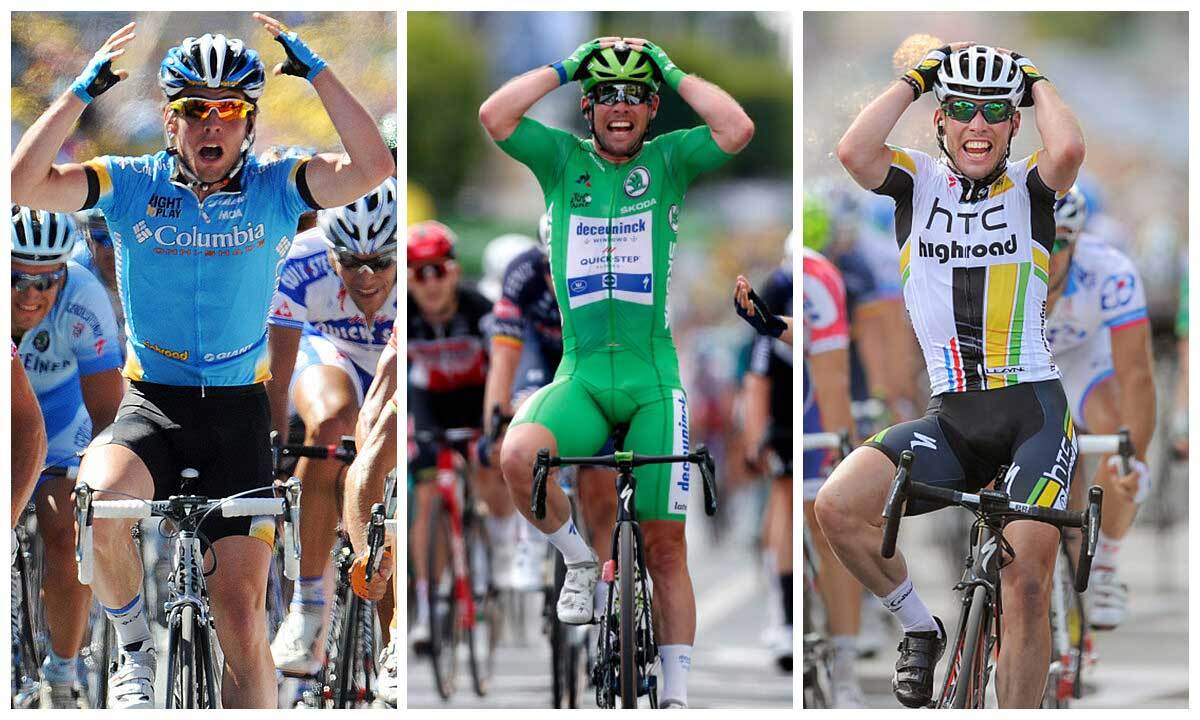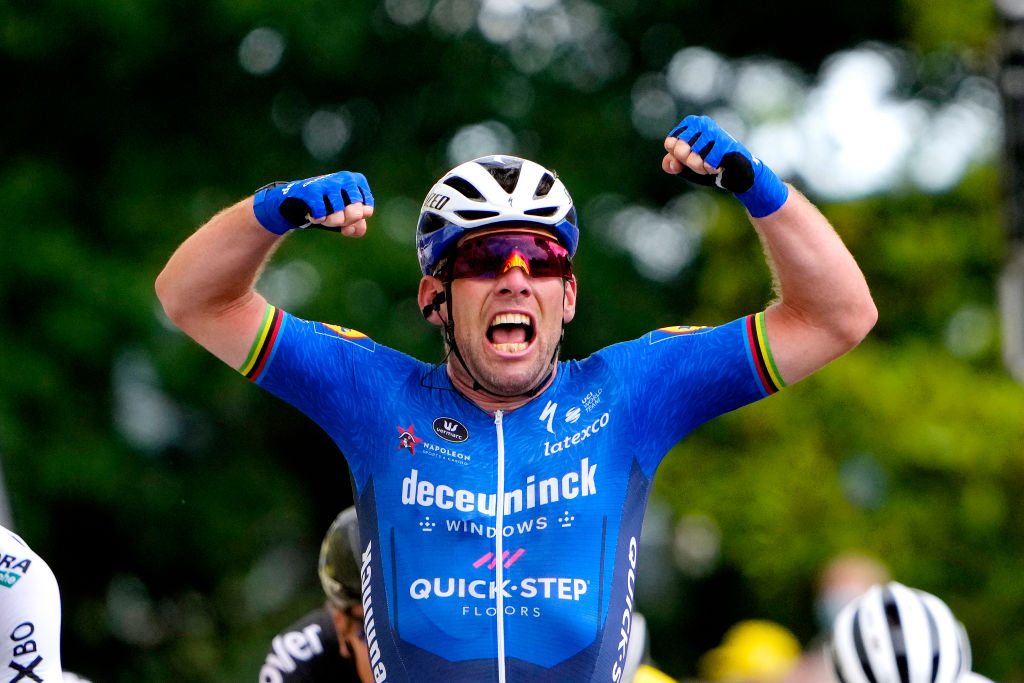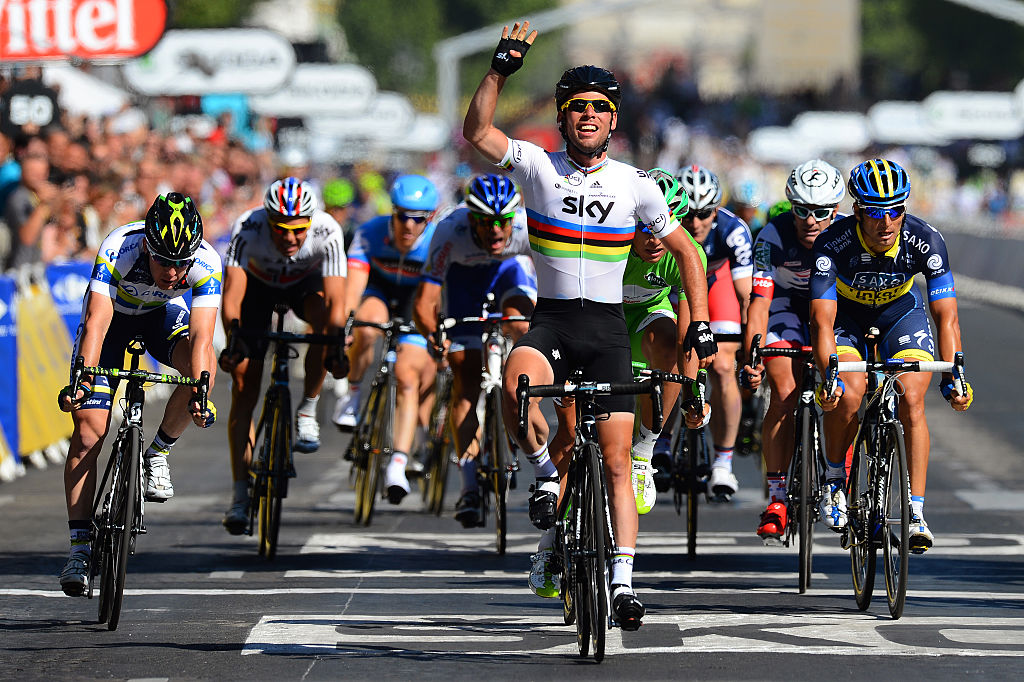Cycling’s best-ever sprinter Mark Cavendish has been knighted and will take aim at a record 35th Tour de France stage win later this year as Sir Mark Cavendish.
Cavendish received the knighthood as part of the 2024 King’s Birthday Honours in the UK for his outstanding contribution to cycling, charity work, and role as a sporting ambassador for the Isle of Man and the UK.
The Manxman has been an icon of British sport since bursting into the spotlight in the late 2000s, going on to build a legacy as one of sport’s most charismatic and compelling figures.
Cavendish’s longevity has seen his career crossover with Lance Armstrong, Chris Froome and now Tadej Pogačar, maintaining high-level performance throughout the years.
It’s a testament to his continued hunger and never-say-die attitude that he’s been able to score wins from Scheldeprijs in 2007 right the way through to this year’s Tour de Hongrie where he ‘officially’ became the most successful sprinter ever after overtaking Mario Cipollini in professional wins.
“Sir Mark is a phenomenal athlete, role model and ambassador for both his sport and the Isle of Man,” said Chief Minister of the Isle of Man, Alfred Cannan MHK. “He has performed at the highest level for more than a decade and his ‘never say die’ attitude is truly an inspiration for us all.”
The characteristics that have seen Cavendish become the modern superstar he is today, have seemingly always been there, with those who mentored him as a young boy recognising the same drive and ambition to succeed that fuels him now in his first races at the Isle of Man National Sports Centre.
The latest race content, interviews, features, reviews and expert buying guides, direct to your inbox!
“When I was coaching Mark as a boy, I had no doubt that he would go on to achieve amazing things. He was very passionate and driven – he would study courses to work out the best way around and research the latest gadgets to help him succeed,” said Cavendish’s first-ever coach Dot Tilbury.
“He comes back to the Island regularly and goes cycling with his children. It always causes lots of excitement whenever they are over.
“Everyone in the Isle of Man, from young children to grannies, is so very proud of what he’s achieved. He has inspired many children to think that you don’t have to come from a big city to go after what you want in life.”
A born winner

Cavendish, 39, always knew he was going to succeed, backing up his arrogance from interviews at his first Tour de France, which didn’t end in the success he’s come to be known for, at each test throughout his illustrious career.
He’s racked up 34 wins at the biggest race, admitting multiple times how just one would have been enough. However, when he tried to hit the ground running in 2007 as a bullish 22-year-old on the T-Mobile Team, it came with crashes and tears during the UK Grand Départ and an eventual abandon in the Alps.
It wasn’t until his second attempt at the Tour that the success on the biggest stage he had awaited finally materialised, marking a new era of sprinting as he defeated Óscar Freire and Erik Zabel in Châteauroux and celebrated with his hands on his head in disbelief.
It wasn’t so much an era of new sprinters, despite the rivalry he had with Andre Greipel and Marcel Kittel who are greats in their own right, but the era of Mark Cavendish.
He would use the same celebration in Châteauroux 3 years later in 2011 when he returned to the city in central France before mirroring it once more some 13 years later at the 2021 Tour when he made a remarkable comeback to form.
And it was that 2021 edition of the race he became so synonymous with that was his greatest race, finding his way back to the absolute pinnacle of the sport and managing four more magic wins after five long years without his arms in the air at Grand Tour.
The Comeback King

In fact, they were barely raised in celebration at all between 2016 and 2021, with time out due to Epstein-Barr Virus and clinical depression seeing his personal and professional life decline. Until he thankfully reached out for professional help from former team doctors and with the support of his family, got himself on a brighter path in his journey with mental health.
Time’s got so bad that fans thought they had seen the last of Cavendish in 2020 when a teary post-race interview with Sporza at Gent-Wevelgem saw the then Bahrain-McLaren rider choke up and state “That’s perhaps the last race of my career”.
But then arrived a homecoming. First back to the team that he scored 43 wins at between 2013 and 2015, Patrick Lefevere’s Deceuninck Quick-Step, then to the Belgian squad’s Tour team. Brought in as a replacement for Sam Bennett, and off the back of his first pro wins in three seasons at Tour of Turkey.
By this point, Cavendish was already second in the all-time Tour stage wins list to Eddy Merckx and well-established as a legend and probably the greatest sprinter of all time.
Having not been at the Tour since 2018 when his best result was eighth and he finished outside the time limit, not to mention where he’d been the season prior, being back at the Tour itself was a victory. Let alone winning another stage.
Fougères, Châteauroux, Valence and Carcassonne. Four locations, some known, some new but the result was all the same. Cavendish had returned to winning ways and drew equal with Eddy Merckx’s record of 34 stage wins.
Only the 35th remains

While he’s a bona fide Tour legend, Cavendish’s success extended outside of July, also taking the win at Milan-San Remo in 2009 where he chased down a late move from Heinrich Haussler and nailed him on the line to become Britain’s first winner of La Classicissima since Tom Simpson in 1964.
Cavendish was also the road World Champion in 2011 after probably his best season when he and HTC-Highroad were at their peak and dominated the Tour’s sprints to take five stage wins and the green jersey. Tony Martin, Bernie Eisel and long-term last man Mark Renshaw were among those on the team who were key to the Manx Missile firing.
With the rainbow jersey on his back in 2012, Cavendish made a big move as cycling boomed in the UK to Sky Procycling, where he’d reunite with many of the Brits he’d grown up racing with.
This was alongside the likes of Bradley Wiggins, who Cavendish felt was like a brother, with the former becoming the first-ever Briton to win the Tour de France. An achievement that as part of that team Cavendish has stated was his greatest.
Wiggins would then produce one of the most memorable moments in British cycling history by accelerating into unknown territory for the maillot jaune up the Rue de Rivoli and doing part of the lead-out for Cavendish onto the world’s most famous street, the Champs-Élysées.
It led to the fourth win on that stage for Cavendish in a row on the final day of the Tour and was a mate helping out a mate for victory. Amazingly, as things tended to happen in Cavendish’s career, another British friend of the Manxman would help him in a similar fashion 11 years later at the Giro d’Italia.
This time it was Geraint Thomas, who after losing the Giro overall just the day prior, gestured his head to Cavendish’s final faltering lead-out rider and kept him near enough to the front to take a stunning sprint win in Rome in front of the Colosseum.
With Cavendish as Astana Qazaqstan, they were no longer teammates at Sky nor British juniors making their way through the ranks together, but Thomas felt he could help a friend out so he did. This was Cavendish’s 54th and most recent Grand Tour victory and was due to be his last after announcing his retirement at the same Giro and crashing out of the Tour later that season.
But Cavendish couldn’t stay away, still confident he had it in him to win once more at the Tour and stand alone at the top of the leaderboard away from Merckx. He’s come back from another broken collarbone and after looking shaky at the start of the season without much success, a win in Turkey seems to have him back on track.
Whether he manages a record 35th or doesn’t, it won’t particularly matter. The legend of Sir Mark Cavendish as cycling’s finest-ever sprinter was cemented years ago.

